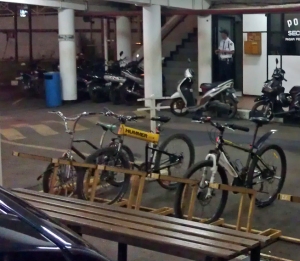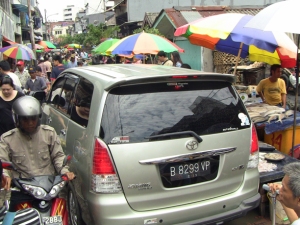Sorry! The list now is at: http://changingtransport.wordpress.com/2012/02/08/bicycle-parking-in-jakarta-parkir-sepeda-di-jakarta/
Indonesia
Jakarta needs more people? Jakarta?
Tonight I attended a presentation by a couple of researchers from the World Bank. One of them made the “counterintuitive” assertion that Jakarta’s public transportation required greater density. He then mentioned, among other places, Curitiba, Brazil – the home of Bus Rapid Transit – as a model. When I spoke with him afterward, he again contended that 1) greater density, by itself, would lead to improved public transit in Jakarta and 2) Curitiba was denser.
So what’s wrong here? Continue reading
Southeast Asian toilet signs, Nos. 3a-3d
All four(!) of these signs were in the same stall. No need to take a magazine! The middle sign indicates the location: the Cikini branch of KFC in Jakarta.
The translation on the top sign is a little loose. More literally, it reads: “Honored customer, please do not throw toilet tissue or pads into the toilet because it can cause the toilet to be clogged. Thank you.”
The bottom sign says, “Honored customer, please do not urinate on the floor. Thank you.”
Actually, in referring to urination this sign uses the phrase, “throw little water.” And what everyone translates as “thank you” is literally the command, “receive love/affection.” While we’re at it, I’ve translated “customer yang terhormat” quite literally as “honored customer”; most people render it as “dear customer,” which is a bit of an alteration but certainly more colloquial.
I had to take this photo quickly because someone else entered the bathroom right then. (Just in case taking pictures in a bathroom somehow doesn’t look right to Indonesians.) The sign was above the toilet-paper dispenser. It says: “From each sheet of toilet tissue that you use, a tree has been felled. So using it effectively and efficiently saves our world.” I don’t know why it says ‘from,’ but probably you get the idea.
Southeast Asian Toilet Signs, No. 1
I photographed this sign inside a stall inside a mall named the Jakarta Design Center. Translated a bit literally from Indonesian, it reads:
“Requesting attention for common comfort:
- No stepping on the toilet seat.
- Flush toilet after it is used.
- Throw used tissue paper into the trash bin provided.
- Take care that the floor remains dry and clean.
Shame & privilege: A guest comment
I asked an Indonesian social scientist to read my recent post on the lack of expressions of guilt or shame in many Indonesian disputes. She generously wrote a short treatise, which I have translated:
This is a difficult topic within the Indonesian context. It has been discussed for a long time. The culture is focused more on shame than on guilt, so ‘face’ is protected quite a bit, to avoid shame. Thus, I think, if people don’t get caught doing wrong, then they feel that there’s no problem. In that case, they tend to keep quiet, because they feel that their ‘face’ is secure. If, conversely, they’re caught, then they’ll make a big effort to maintain ‘face’ by all means available – which certainly can end up appearing odd. Indeed, their actions might seem absurd to others and even make it clearer that they’ve done something wrong.
Toilet trauma
 Aside from eating fish eyes, using squat toilets might be the scariest aspect of living in Indonesia. But, for at least one Indonesian, the toilet is on the other foot: detikNews reports, and the Jakarta Globe repackages in English, one man’s ordeal of getting his foot stuck in a public, sit-down toilet for nine hours.
Aside from eating fish eyes, using squat toilets might be the scariest aspect of living in Indonesia. But, for at least one Indonesian, the toilet is on the other foot: detikNews reports, and the Jakarta Globe repackages in English, one man’s ordeal of getting his foot stuck in a public, sit-down toilet for nine hours.
How can this happen? In case, like me until recently, you have no experience with the squat toilet, here’s a brief explanation of the relevant details. In the picture above, the toilet user – male or female, peeing or defecating – squats on the ridges beside the basin, facing the camera, and does what needs doing. S/he then washes off the relevant parts with a spray nozzle, with water splashed or poured from a dipper, and/or with a hand. Continue reading
Guilt, shame, or neither?
 I recently read a research article on how Indonesian schools treat students who misbehave. The author raises and unfortunately mangles the guilt/shame contrast, but the whole exercise provoked me into thinking about the expectations that Indonesians display when someone faces accusations of wrongdoing. In short, displays of guilt or shame are in short supply; instead, criminals or the accused try an incredible variety of tactics, many of them public, to avoid responsibility. I’m searching for the one word, equivalent to guilt or shame, that can encapsulate this phenomenon.
I recently read a research article on how Indonesian schools treat students who misbehave. The author raises and unfortunately mangles the guilt/shame contrast, but the whole exercise provoked me into thinking about the expectations that Indonesians display when someone faces accusations of wrongdoing. In short, displays of guilt or shame are in short supply; instead, criminals or the accused try an incredible variety of tactics, many of them public, to avoid responsibility. I’m searching for the one word, equivalent to guilt or shame, that can encapsulate this phenomenon.
The contrast between guilt and shame, as I was taught it, is this: In ‘guilt’ societies, people think that wrongdoers will change their ways only after they feel guilty about doing wrong – that is, if they feel bad regardless of whether anyone else knows what they did. Thus, in U.S. sentencing and parole board hearings, the convicts work express their feeling of guilt. Continue reading
You’re not qualified to work at Dunkin’ Donuts.
Here are the qualifications for working at Dunkin’ Donuts in Jakarta, as posted on the window of an outlet at a gas station. If you’re a relatively tall, thin, young, and attractive high school graduate who doesn’t wear glasses, a job is waiting for you!
- Male or female, maximum age 22, not yet married.
- Once you reach 23 or get married, you get to help make the popular Soylent Green doughnut.
- Minimum height: for males, 165 cm (5′ 5″); for females, 157 cm (5′ 1.8″).
- I guess males need to be taller because … Okay, I don’t know why. Continue reading
Done climbed a volcano
 About a month ago, we climbed Mount Pangrango, aka Gunung Pangrango, with the Java Lava hiking group. We climbed to the summit (rising from 4100 to 9900 feet above sea level), camped overnight, and returned, passing through miles of jungle, a steaming-hot waterfall, and some very steep and slippery terrain.
About a month ago, we climbed Mount Pangrango, aka Gunung Pangrango, with the Java Lava hiking group. We climbed to the summit (rising from 4100 to 9900 feet above sea level), camped overnight, and returned, passing through miles of jungle, a steaming-hot waterfall, and some very steep and slippery terrain.
We awoke early at a lodge in a small town at the foot of the volcano and could glimpse it looming nearby.
All cats, no monkeys
 Before coming to Jakarta, I imagined that I would hear birds sing and squawk, see squirrels scamper and lizards wriggle, battle giant bugs, and perhaps occasionally glimpse wild monkeys in a park. My actual experience has been almost completely different. Here, it’s lots of skinny cats and giant rats and not much else. Both are amazingly easy to find – often in close proximity to each other because the rats are much too big for the tiny cats to kill. Continue reading
Before coming to Jakarta, I imagined that I would hear birds sing and squawk, see squirrels scamper and lizards wriggle, battle giant bugs, and perhaps occasionally glimpse wild monkeys in a park. My actual experience has been almost completely different. Here, it’s lots of skinny cats and giant rats and not much else. Both are amazingly easy to find – often in close proximity to each other because the rats are much too big for the tiny cats to kill. Continue reading





